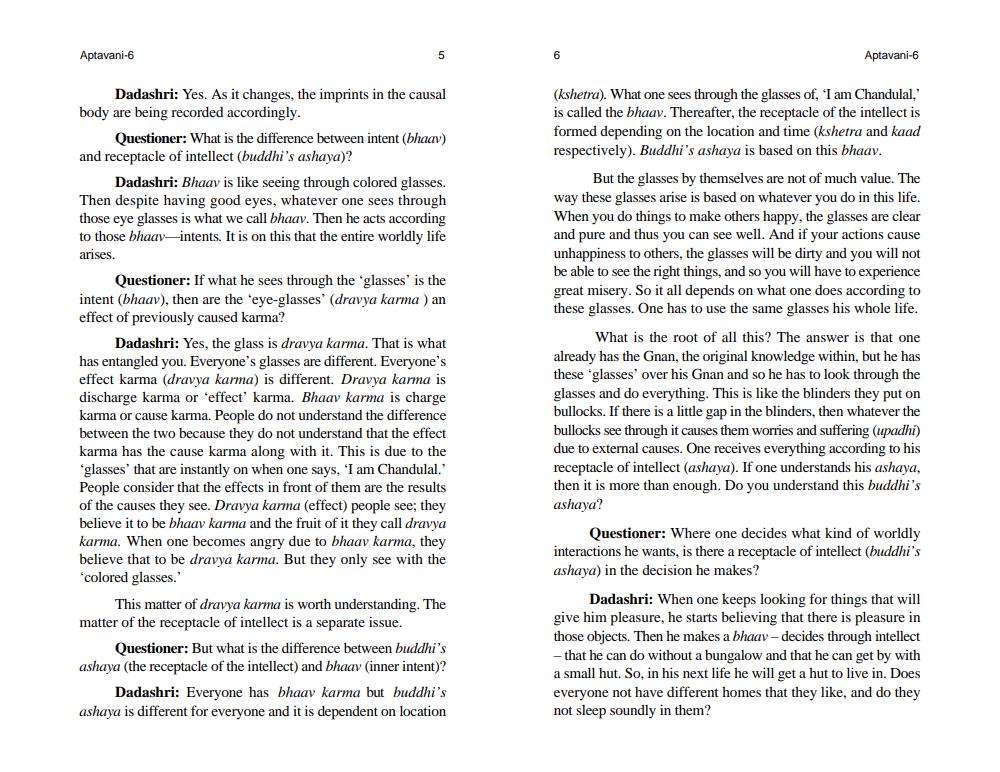________________
Aptavani-6
5
Dadashri: Yes. As it changes, the imprints in the causal body are being recorded accordingly.
Questioner: What is the difference between intent (bhaav) and receptacle of intellect (buddhi's ashaya)?
Dadashri: Bhaav is like seeing through colored glasses. Then despite having good eyes, whatever one sees through those eye glasses is what we call bhaav. Then he acts according to those bhaav-intents. It is on this that the entire worldly life arises.
Questioner: If what he sees through the 'glasses' is the intent (bhaav), then are the 'eye-glasses' (dravya karma) an effect of previously caused karma?
Dadashri: Yes, the glass is dravya karma. That is what has entangled you. Everyone's glasses are different. Everyone's effect karma (dravya karma) is different. Dravya karma is discharge karma or 'effect' karma. Bhaav karma is charge karma or cause karma. People do not understand the difference between the two because they do not understand that the effect karma has the cause karma along with it. This is due to the 'glasses' that are instantly on when one says, 'I am Chandulal.' People consider that the effects in front of them are the results of the causes they see. Dravya karma (effect) people see; they believe it to be bhaav karma and the fruit of it they call dravya karma. When one becomes angry due to bhaav karma, they believe that to be dravya karma. But they only see with the 'colored glasses.'
This matter of dravya karma is worth understanding. The matter of the receptacle of intellect is a separate issue.
Questioner: But what is the difference between buddhi's ashaya (the receptacle of the intellect) and bhaav (inner intent)?
Dadashri: Everyone has bhaav karma but buddhi's ashaya is different for everyone and it is dependent on location
6
Aptavani-6
(kshetra). What one sees through the glasses of, 'I am Chandulal,' is called the bhaav. Thereafter, the receptacle of the intellect is formed depending on the location and time (kshetra and kaad respectively). Buddhi's ashaya is based on this bhaav.
But the glasses by themselves are not of much value. The way these glasses arise is based on whatever you do in this life. When you do things to make others happy, the glasses are clear and pure and thus you can see well. And if your actions cause unhappiness to others, the glasses will be dirty and you will not be able to see the right things, and so you will have to experience great misery. So it all depends on what one does according to these glasses. One has to use the same glasses his whole life.
What is the root of all this? The answer is that one already has the Gnan, the original knowledge within, but he has these 'glasses' over his Gnan and so he has to look through the glasses and do everything. This is like the blinders they put on bullocks. If there is a little gap in the blinders, then whatever the bullocks see through it causes them worries and suffering (upadhi) due to external causes. One receives everything according to his receptacle of intellect (ashaya). If one understands his ashaya, then it is more than enough. Do you understand this buddhi's ashaya?
Questioner: Where one decides what kind of worldly interactions he wants, is there a receptacle of intellect (buddhi's ashaya) in the decision he makes?
Dadashri: When one keeps looking for things that will give him pleasure, he starts believing that there is pleasure in those objects. Then he makes a bhaav - decides through intellect - that he can do without a bungalow and that he can get by with a small hut. So, in his next life he will get a hut to live in. Does everyone not have different homes that they like, and do they not sleep soundly in them?




